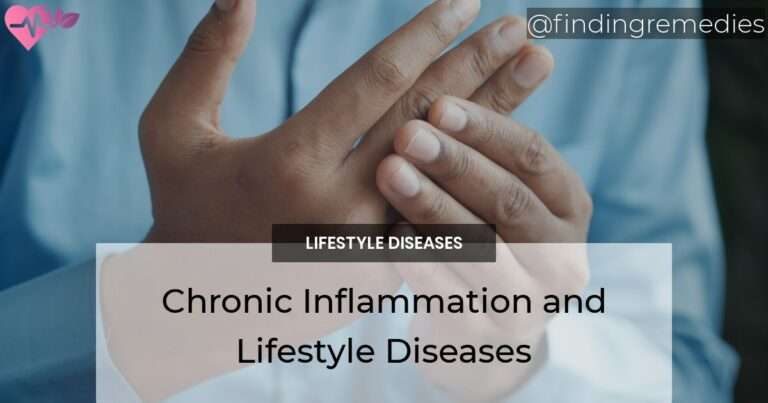Chronic inflammation is a common yet complex condition that affects millions of people worldwide. It refers to a prolonged immune response that can lead to tissue damage, resulting in various health disorders.
Chronic inflammation is linked to several lifestyle diseases, including diabetes, cardiovascular diseases, Alzheimer’s, and arthritis, among others. Understanding the mechanisms behind this link and exploring treatment options can help individuals prevent and manage chronic inflammation and associated lifestyle diseases.
In this article, we look at the connection between chronic inflammation and lifestyle diseases.
Table of Contents
What is Chronic Inflammation?
Chronic inflammation is a long-term immune response characterized by the infiltration of immune cells, including macrophages, lymphocytes, and monocytes, into the affected tissues. It is triggered by various factors, including infections, exposure to toxins or pollutants, autoimmune disorders, and lifestyle factors such as diet, exercise, and stress.
Causes of Chronic Inflammation
Chronic inflammation can be caused by various factors, including:
- Exposure to environmental toxins or pollutants
- Infections and chronic viral or bacterial diseases
- Chronic stress
- Poor diet and lack of exercise
- Autoimmune disorders
- Obesity
Symptoms of Chronic Inflammation
Chronic inflammation can manifest in various ways, including:
- Fatigue and lethargy
- Muscle and joint pain
- Recurrent infections
- Digestive problems
- Skin rashes and irritations
- Allergies
- Mood disorders
The Relationship between Chronic Inflammation and Lifestyle Diseases
Lifestyle diseases are health conditions that are caused by unhealthy lifestyle choices, including poor diet, lack of exercise, and chronic stress. Chronic inflammation has been linked to various lifestyle diseases, including:
Understanding Lifestyle Diseases
Lifestyle diseases are health conditions that are caused by unhealthy lifestyle habits, including poor diet, lack of exercise, and chronic stress. Examples of lifestyle diseases include cardiovascular diseases, diabetes, cancer, and Alzheimer’s, among others.
How Chronic Inflammation Leads to Lifestyle Diseases
Chronic inflammation contributes to the development of lifestyle diseases in several ways, including:
- Impairment of insulin sensitivity, leading to diabetes
- Promotion of atherosclerosis, leading to cardiovascular diseases
- Activation of cancer pathways, leading to cancer
- Neuroinflammation, leading to Alzheimer’s disease
- Joint inflammation, leading to arthritis
Common Lifestyle Diseases Associated with Chronic Inflammation
Lifestyle diseases that are commonly associated with chronic inflammation include:
- Cardiovascular diseases
- Diabetes
- Cancer
- Alzheimer’s disease
- Arthritis
Mechanisms Behind the Link between Chronic Inflammation and Lifestyle Diseases
The link between chronic inflammation and lifestyle diseases is complex and multifactorial. Here are some mechanisms that explain this relationship:
How Chronic Inflammation Affects the Body’s Hormonal Balance
Chronic inflammation can disrupt the body’s hormonal balance, leading to various health problems. For example, it can interfere with the production and activity of insulin, leading to insulin resistance and diabetes. Chronic inflammation can also affect the production of other hormones, including cortisol, estrogen, and testosterone, leading to mood disorders, weight gain, and other health problems.
How Chronic Inflammation Impairs Insulin Sensitivity
Chronic inflammation can impair insulin sensitivity, leading to insulin resistance and diabetes. Inflammation can disrupt the production and activity of insulin receptors, leading to reduced insulin sensitivity and increased blood sugar levels. Insulin resistance is a hallmark of type 2 diabetes, a common lifestyle disease associated with chronic inflammation.
How Chronic Inflammation Impacts the Cardiovascular System
Chronic inflammation can promote atherosclerosis, a condition characterized by the accumulation of plaque in the arteries, leading to cardiovascular diseases such as heart attacks and strokes. Inflammation can trigger the production of inflammatory cytokines, leading to the activation of endothelial cells and the accumulation of immune cells in the arterial walls. This process can lead to the formation of plaques and the narrowing of the arteries, leading to reduced blood flow and increased risk of cardiovascular diseases.
Treatment Options for Chronic Inflammation and Lifestyle Diseases
Managing chronic inflammation and associated lifestyle diseases requires a multifaceted approach that involves lifestyle changes, medical treatment, and natural remedies. Here are some treatment options:
Lifestyle Changes to Combat Chronic Inflammation
Making healthy lifestyle changes can help reduce chronic inflammation and prevent lifestyle diseases. Here are some lifestyle changes that can help:
Dietary Changes
- Eat a diet rich in anti-inflammatory foods, including fruits, vegetables, nuts, and omega-3 fatty acids
- Avoid processed and sugary foods that can trigger inflammation
- Limit alcohol and caffeine consumption
Exercise and Physical Activity
- Engage in regular physical activity to reduce inflammation and improve insulin sensitivity
- Incorporate strength training and aerobic exercises into your routine
Stress Reduction Techniques
- Practice mindfulness meditation, yoga, or deep breathing exercises to manage stress and reduce inflammation
- Get enough sleep to reduce stress hormones and promote healing
Medical Treatment for Chronic Inflammation and Lifestyle Diseases
Medical treatment for chronic inflammation and associated lifestyle diseases may include:
Medications for Inflammation
- Non-steroidal anti-inflammatory drugs (NSAIDs) to reduce inflammation and pain
- Corticosteroids reduce inflammation and suppress the immune system
- Biologic agents that target specific inflammatory pathways
Medications for Lifestyle Diseases
- Insulin or oral medications to manage blood sugar levels in diabetes
- Statins and blood pressure medications to manage cardiovascular diseases
- Chemotherapy, radiation therapy, or targeted therapies to treat cancer
Natural Remedies to Reduce Chronic Inflammation
Several natural remedies can help reduce chronic inflammation and prevent lifestyle diseases, including:
Herbal Supplements
- Turmeric, ginger, and boswellia extracts, have anti-inflammatory properties
- Resveratrol, quercetin, and green tea extracts, which have antioxidant and anti-inflammatory effects
Anti-Inflammatory Foods
- Fruits and vegetables rich in antioxidants, including berries, leafy greens, and cruciferous vegetables
- Omega-3 fatty acids found in fatty fish, nuts, and seeds, can help reduce inflammation
In conclusion, Chronic inflammation is a complex condition that contributes to the development of various lifestyle diseases. Understanding the mechanisms behind this link and exploring treatment options can help individuals prevent and manage chronic inflammation and associated lifestyle diseases. Making healthy lifestyle changes, seeking medical treatment, and incorporating natural remedies can help reduce inflammation, improve overall health, and prevent chronic diseases.

